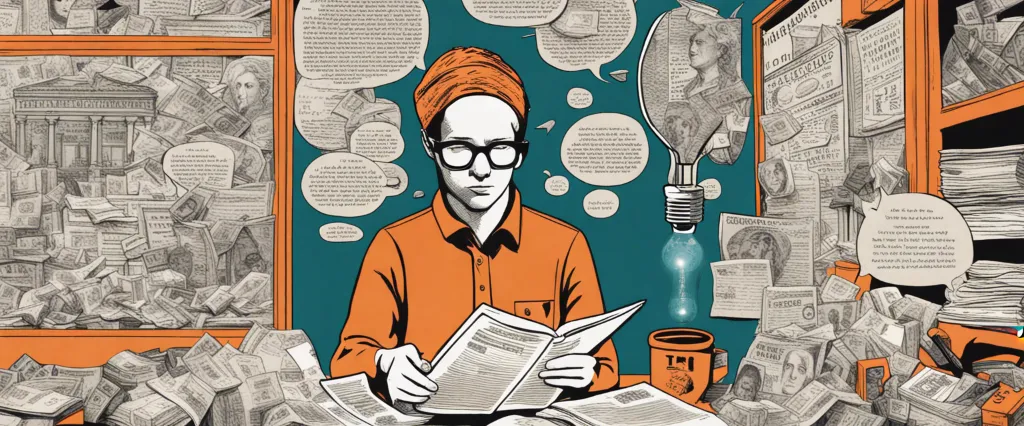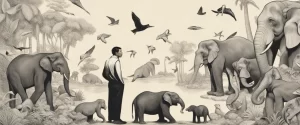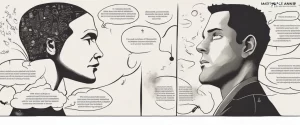——The Undercover Economist by Tim Harford & The Long Emergency by James Howard Kunstler

In the realm of literature, books often serve as our enduring guides, offering deep insights into diverse aspects of our world. This study aims to compare and contrast two influential works that shed light on contrasting aspects of our global reality – “The Undercover Economist” by Tim Harford and “The Long Emergency” by James Howard Kunstler. While these books diverge in their subject matter and approach, they both tackle critical issues of contemporary significance – economics and the environment.
The Undercover Economist” penned by renowned author Tim Harford, serves as an indispensable introduction to the fascinating world of economics. Harford, an economist himself, combines real-life stories with comprehensive analysis to unravel the intricate web of economic concepts that govern our daily lives. By uncovering the hidden logic behind everyday occurrences such as coffee prices or airline ticket fluctuations, the author aims to demystify the complexities of economics and demonstrate its omnipresence in our society.
On the other end of the spectrum, “The Long Emergency” by James Howard Kunstler presents an urgent and thought-provoking exploration of the imminent environmental crisis. In this provocative work, Kunstler paints a bleak portrait of a world grappling with the consequences of dwindling energy resources, environmental degradation, and climate change. The author argues that these looming crises will culminate in a profound societal shift, reshaping our economies, landscapes, and even our individual lives. Driven by his background as an environmentalist and social critic, Kunstler challenges conventional notions of progress and invites readers to critically reassess their relationship with the natural world.
This comparative study endeavors to delve into the distinctive ideologies and perspectives offered by Harford and Kunstler in their respective works. By examining their writing styles, research methodologies, and core arguments, we will seek to unravel the underlying themes that underpin their individual narratives. Furthermore, this study aims to bridge the gap between these contrasting viewpoints, seeking potential areas of overlap or integration, and thus extracting a nuanced understanding of the complex interplay between economics and the environment in our contemporary world.
Through a careful analysis of “The Undercover Economist” and “The Long Emergency,” this study aims to contribute to a comprehensive understanding of the intricate relationship between economic principles and environmental realities. By exploring the divergent viewpoints and solutions presented by Harford and Kunstler, we hope to shed light on the multilayered challenges confronting societies globally. Ultimately, this comparative study seeks to empower readers with an enhanced sense of awareness and discernment, encouraging them to critically evaluate the economic and environmental decisions that shape our collective future.
Brief Summary of Two Books
The Undercover Economist by Tim Harford
The Undercover Economist” by Tim Harford is a book that explores the principles of economics and how they shape our daily lives. The author takes readers on a journey to uncover the hidden economic forces that drive our decision-making and the functioning of markets.
Harford introduces the concept of “rational economic man” and explains how individuals make choices based on their self-interest and incentives. He delves into various economic phenomena, such as price discrimination, externalities, and game theory, and uses real-life examples to illustrate their impact.
The book also sheds light on the role of government in regulating markets and discusses topics ranging from healthcare and education to crime and poverty. Through engaging storytelling and clear explanations, Harford demystifies complex economic concepts and encourages readers to think critically about the choices they make.
Overall, “The Undercover Economist” provides an accessible and thought-provoking look into the economic forces that shape our world, allowing readers to see their surroundings through an economic lens and gain a deeper understanding of how markets and incentives influence our lives.
The Long Emergency by James Howard Kunstler
“The Long Emergency” by James Howard Kunstler is a thought-provoking exploration of the impending challenges humanity may face as a result of climate change, resource depletion, and geopolitical instability. Kunstler argues that our modern way of life, heavily dependent on cheap and abundant fossil fuels, is unsustainable and will inevitably come to an end during what he calls the Long Emergency.
The book emphasizes the interconnection between energy and all aspects of society, pointing out that fossil fuels are not only a source of energy but also the foundation of our economic system, transportation networks, food production, and more. Kunstler predicts that as global oil production declines and climate change wreaks havoc, society will face various crises, including shortages of essential resources, economic collapse, and social unrest.
While “The Long Emergency” sounds alarmist, Kunstler encourages readers to view the impending challenges as an opportunity for creative problem-solving and community building. He argues for a return to localized economies, small-scale agriculture, and renewable energy sources, promoting a more resilient and sustainable way of living. Kunstler also criticizes suburban sprawl and advocates for more walkable, compact communities that prioritize social cohesion and local self-sufficiency.
Overall, “The Long Emergency” serves as a wake-up call, urging readers to reevaluate their lifestyles and the broader systems that underpin our modern society. It emphasizes the need for proactive planning, adaptation, and a fundamental shift in our relationship with energy and resources to navigate the uncertain future ahead.
Comparison between Two Books

Similarities in Economics
Both The Undercover Economist by Tim Harford and The Long Emergency by James Howard Kunstler discuss various aspects of economics, albeit with differing focuses. Despite this, there are a few similarities in their approach to economic themes:
1. Interconnectedness: Both books emphasize how different economic factors are interconnected and how changes in one area can have significant ripple effects on the entire system. Harford explores this idea through his invisible hand metaphor, highlighting how market forces and individual decisions shape the economy. Kunstler, on the other hand, emphasizes the intricate links between energy, transportation, and the economy, arguing that any disruption in one area can lead to significant consequences on a larger scale.
2. Human behavior and incentives: Economics is often driven by human behavior, and both authors recognize this in their respective works. Harford delves into the concept of rational decision-making and how individuals’ actions contribute to the functioning of markets. Kunstler, although focusing more on energy and resource depletion, also considers the role of human behavior and incentives in shaping economic systems and the potential need for change.
3. Responses to economic crises: Both books touch upon the challenges and potential responses to economic crises. Harford discusses how various policy interventions and governmental actions can mitigate the impact of recessions. Similarly, Kunstler explores how societies might have to adapt and transform in the face of energy shortages and potential catastrophic events.
4. Environmental considerations: While not the central focus of The Undercover Economist, Harford does acknowledge the importance of sustainable economic development and incorporates environmental concerns into his analysis. In The Long Emergency, Kunstler explicitly highlights the environmental ramifications of certain economic practices, particularly those tied to fossil fuel consumption.
In summary, both The Undercover Economist and The Long Emergency touch on the interconnections of economics, human behavior and incentives, responses to crises, and the importance of considering environmental factors. While their primary focuses may differ, these shared themes provide some similarities between the books’ treatment of economics.
Divergences in Economics
The Undercover Economist by Tim Harford and The Long Emergency by James Howard Kunstler both delve into economic factors, but they approach the topic from different angles and explore contrasting aspects of economics.
The Undercover Economist focuses on microeconomics, examining how individual actions and decisions impact the overall economy. Harford explores topics such as pricing, incentives, and the concept of the invisible hand. He emphasizes the importance of free markets in allocating resources efficiently and maximizing societal welfare. The book also discusses the role of competition in driving innovation and economic growth.
On the other hand, The Long Emergency focuses on macroeconomics, specifically examining the potential challenges and consequences of energy scarcity and the end of cheap oil. Kunstler argues that society is heavily reliant on finite resources that are being depleted rapidly, leading to economic disruptions. He predicts that this impending crisis will result in significant social and economic upheaval, including disruptions in transportation, agriculture, and manufacturing.
The key divergence between these books lies in their focus. The Undercover Economist emphasizes the functioning of market systems and how individuals’ choices can have wide-ranging implications on the economy. Harford mainly examines the positive aspects of economics, such as efficiency gained through market mechanisms.
Conversely, The Long Emergency is more concerned with potential crises and negative outcomes resulting from economic and resource constraints. Kunstler presents a more pessimistic view, highlighting the consequences of unsustainable resource consumption and the need for societal adaptation.
Additionally, while Harford’s book largely aligns with mainstream economic theory and emphasizes the benefits of market-driven economies, Kunstler offers a more unconventional perspective. He challenges the status quo and argues for a shift in societal values and behavior to cope with the upcoming crisis.
Overall, these two books offer different perspectives on economics. The Undercover Economist focuses on the positive aspects of market systems, whereas The Long Emergency explores the potential negative consequences of resource constraints and poses a more critical view of the current economic system.

Conclusion
Both “The Undercover Economist” by Tim Harford and “The Long Emergency” by James Howard Kunstler are respected books in their respective fields, but they offer different perspectives and cover different topics.
“The Undercover Economist” is a popular economics book that explores the fundamentals of everyday economics and how it affects our lives. Harford is known for his ability to explain complex economic concepts in a simple and engaging manner. The book delves into various topics such as globalization, markets, incentives, and the hidden forces behind everyday choices. It provides valuable insights into economic principles that can help readers understand the world around them. If you are interested in gaining a deeper understanding of economics and how it influences our daily lives, “The Undercover Economist” may be more worthy of your reading.
On the other hand, “The Long Emergency” by James Howard Kunstler focuses on the topic of peak oil and its potential consequences on society. Kunstler, a social critic, discusses how the overuse of fossil fuels is leading to significant challenges, including economic, environmental, and geopolitical problems. While the book’s perspective on the future may be considered more pessimistic, it urges readers to consider alternative energy sources, relocalization, and the need for resilient communities. If you are interested in energy issues, sustainability, and potential future scenarios, “The Long Emergency” could be more worthy of your reading.
Ultimately, the choice between the two books depends on your specific interests and what you are looking to explore further. Both books offer valuable insights, but they cover different subject matters.


